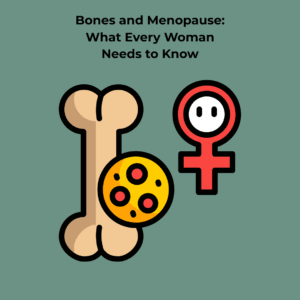What Every Woman Should Know About Menopause and Bone Health
Bones and Menopause: What Every Woman Needs to Know
The Menopause–Bone Connection You Need to Know
Let’s talk honestly: menopause can be a storm of changes, from hot flashes to weight gain, mood swings to sleep disruption. Often very obvious. But what many women don’t realise is that one of the biggest changes is silent—and happening inside their bones.
In the first 5–10 years after menopause, women can lose up to 20% of their bone density. That’s significant.
The culprit? Estrogen. At the onset of menopause this hormone level drops. Throughout our life bones are in a constant process of breaking down and rebuilding. Without the stimulus of estrogen, bones start to break down faster than they rebuild. Your bones lose density which increases the risk of:
- Osteopenia (low bone density)
- Osteoporosis
- Fractures, especially of the hip, spine, and wrist
- Poor posture and shrinking height
- Chronic back pain or joint stiffness
But here’s the good news: there’s plenty you can do to slow, stop, or even reverse this process.
🌡️ Why Menopause And Bone Loss are linked
Estrogen plays a key role in bone remodeling. It helps regulate the balance between the action of calls that have an impact on bone:
- Osteoclasts – which break down bone
- Osteoblasts – which build new bone
When estrogen levels decline, osteoclast activity speeds up, and bone starts being reabsorbed faster than it’s rebuilt. This is especially noticeable in the spine, hips, and jaw.
It’s a bit like a renovation team showing up, demolishing the walls—and forgetting to rebuild them.
🧍♀️ How to Protect Your Bones During and After Menopause
If you’re in your 40s, 50s, or beyond, now’s the time to double down on your bone health. Here are 3 essential actions you can take:
1. Do the Right Kind of Exercise
Not all movement supports bone growth. What you need are:
- Weight-bearing exercises: walking, hiking, stair climbing, dancing
- Resistance training: using body weight, resistance bands, or weights
- Balance exercises: like tai chi or yoga, to reduce falls and fracture-risk events
These activities load the skeleton. To stimulate bone-building, the cells requires the bone to be compressed, flexed and torsioned.
Pro tip: Aim for at least 3 sessions of weight/resistance exercise per week. If you’re unsure where to start, a chiropractor or exercise physiologist can help guide you safely.
2. Nourish with Bone-Friendly Nutrients
The top nutrients to support menopause and bone health:
- Calcium (1,000–1,300 mg/day): dairy, leafy greens, tofu, sardines
- Vitamin D (600–1,000 IU/day): sunlight, fatty fish, eggs, or supplements
- Magnesium: nuts, seeds, whole grains
- Protein: essential for bone matrix—don’t skimp
Supplements may be needed, especially if your dietary intake or sun exposure is low. Speak to your GP or pharmacist for guidance.
3. Get Regular Bone & Spine Check-Ups
- A DEXA scan measures your bone density and is often recommended post-menopause.
- A chiropractic assessment can identify postural changes, spinal stiffness, or joint issues linked to bone health.
As chiropractors, we often notice:
- Shrinking height
- Rounding shoulders or forward head posture
- Changes in spinal curvature
- Increased back or hip discomfort
These are all red flags that your bones might be under stress—and we can help support alignment and safe movement to reduce that strain.
💬 A Word of Encouragement
Menopause is a natural phase—but it doesn’t mean your body has to decline. With the right strategies, you can keep your bones strong, your spine tall, and your body moving freely well into your 70s, 80s, and beyond.
✅ 3 Things You Can Do Today
- Get moving with resistance or weight-bearing activity
- Review your diet or supplement intake to boost calcium and vitamin D
- Book a chiropractic check-up to catch posture or bone stress early
Concerned about bone loss during menopause? Let’s take action together. Book a spinal and posture check-up today to stay ahead of the changes and move confidently into your next chapter.
https://www.graceofnoage.com/menopause-musculoskeletal-health-guide/
